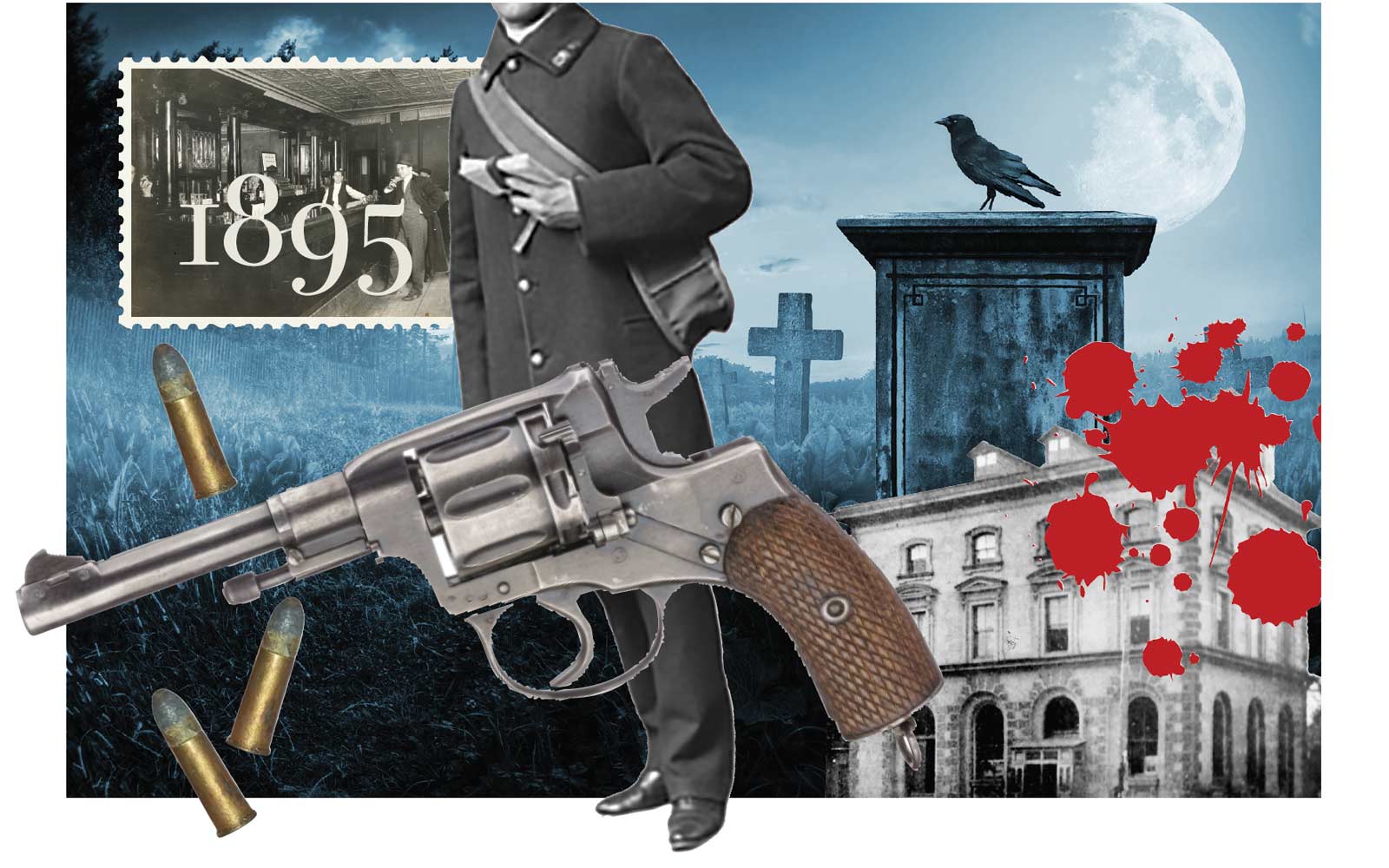
Collage images Courtesy of Northumberland County Archives and Museum
The incident is long forgotten, but in 1895, a mailman “went postal” and shot a prominent lawyer to death at his desk in his downtown Cobourg office. It was a bizarre and dramatic scene that plays out like a psycho-mystery movie.
How do we piece together the final moments of John Cruikshank’s life on that fateful evening in October 1895? It’s easier than you think. Just go straight to the dead man talking:
“I was sitting in a chair in my office when John Phillips entered. He walked up to me and said something about my sending him a paper, then drew a revolver and shot me three times. I tried to get out of my chair when he fired the first and second shots, which were almost simultaneous, but I could not. Phillips then said, ‘I will finish you this time,’ and turned toward the door. I said, ‘I think you have finished me.’ He turned and shot me a third time.”
Yes, despite seven bloody wounds from three bullets, 38-year-old John Young Cruikshank, a promising lawyer and one of Cobourg’s most eligible bachelors, lived long enough to give a deposition about the circumstances of his own death. Shortly after, he succumbed to his injuries. His was the first murder in Cobourg in a decade.
Only 15 minutes before shots were fired, 70-yearold John Phillips, a mail carrier who had lived in Cobourg for at least 25 years, had nonchalantly dropped into the office of a coal dealer and ordered the delivery of a ton of fuel. It was an odd move, considering his state of mind, for he had also purchased several cartridges for his revolver that day. In the afternoon, Phillips had likewise visited St. Peter’s Cemetery and raked the leaves from the family plot where his mother and two of his young children were buried. The caretaker chatted with him and saw nothing unusual about this, but other observers caught sight of Phillips pacing around town, agitated and distracted. It seems a fuse had been lit in his mind, and soon there would be no turning back.
“If it were not for the law,” he shouted in front of several witnesses, “I would crush your head as I would a lemon.”
Bad blood between Phillips and Cruikshank had arisen a few days earlier over the sale of a parcel of land that Phillips had sold to Cruikshank’s client, George Spence, a town councillor. By a newspaper account, the land was paid for, but Phillips refused to relinquish title. Something about the transaction was sticking in his craw and he demanded Cruikshank hand over some deeds and legal papers. Cruikshank insisted Phillips already had what he needed, but Phillips wouldn’t let it go. The two exploded into a heated argument. The newspaper said the encounter would have come to blows had Phillips’ son not intervened to calm his father.
Time passed, but something had snapped in Phillips. Upon seeing Cruikshank one evening at dinner at the Dunham Hotel, his rage boiled over again. “If it were not for the law,” he shouted in front of several witnesses, “I would crush your head as I would a lemon!” Unfazed, Cruikshank slapped him with a $2,000 slander suit. For Phillips, that was the last straw.
In the aftermath of the shooting, news travelled fast. At first, all the attention was on Cruikshank’s chances of survival, but the next morning, the story suddenly took a new and macabre twist. Overnight, the police could find no trace of Phillips, but the search came to an abrupt end when the cemetery caretaker reported a gruesome discovery. There, beside the family headstone that Phillips had visited the day before, he found Phillips’ body on a neatly arranged bed of evergreen boughs. He was lying on his own grave, a gunshot through his head and his revolver still in his hand. In his pocket were some bullets, cartridges, and oddly enough, his receipt for the coal delivery.
To 21st century eyes, there is something strangely modern about this case: not just a murder but a murder-suicide whose sole motivation was blind rage. At the time, it left Cobourg dumbstruck. “The terrible affair created a great sensation,” said the Cobourg World, “as both parties were well known in the town and connected with highly respected families.” Cruikshank, in particular, was widely mourned. From humble beginnings on the family homestead north of town, he had only recently taken over the legal practice of the renowned Hon. Sidney Smith and was active in the Conservative Party. He was obviously a man with a future. His funeral, held at his parents’ farm,* attracted hundreds, including Cobourg’s professional elite and the local M.P. They watched as the cortege, led by Cruikshank’s five brothers and a brother-in-law as pallbearers, laid him to rest at the Plainville church cemetery. The press overflowed with sympathy for the family and their loss. Phillips’ memorial went unreported.
*The brick Cruikshank farmhouse still stands on the east side of Burnham Street in Plainville.
Story by:
Tom Cruickshank




